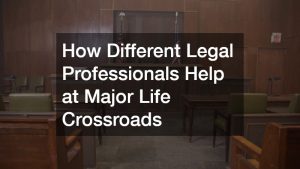- Legal empowerment means giving individuals and communities the power to understand and protect their rights.
- Knowing your legal rights and options is essential for informed decision-making as an older adult.
- Appointing a trusted decision-maker, like a family member, friend, or professional, is vital.
- Advance care planning involves making decisions about healthcare services if you become unable to speak for yourself.
- Communicate end-of-life preferences and goals with loved one’s now, including desired location and pain relief.
As you age, you face numerous legal challenges that require informed decisions. Whether planning for retirement, preparing a will, or dealing with medical conditions, having the correct legal information can be the key to making the best decisions for ourselves and our loved ones.
However, navigating the complex legal world can be overwhelming, and that’s why it’s essential always to empower yourself legally.
Legal empowerment means giving individuals and communities the power to know and protect their legal rights. When legally empowered, you can take control of your life’s planning and decision-making.
You can make informed decisions about your assets, healthcare, and other legal matters in a way that best serves your interests. Protecting and enforcing your rights is also essential, especially as you age.
This blog post delves into the importance of legal empowerment and how you can make informed decisions for your best interest.
Understanding Your Legal Rights and Options
The first step towards legal empowerment is understanding your legal rights and options. As an older adult, you have a range of legal protections and rights regarding healthcare, housing, finances, and other aspects of life. Taking the time to understand these rights and protections is crucial for informed decision-making.
Exploring the Concept of Legal Empowerment
Legal empowerment is a concept that has gained attention in recent years. It refers to empowering individuals and communities through legal education, awareness, and access to justice.
It is a tool for fighting against inequality and promoting social justice. Legal empowerment can help you in various ways, such as navigating legal processes and accessing essential services.
Knowing Your Rights and Protections as an Older Adult:
As an older adult, you have a range of legal rights and protections that you need to know. These include access to healthcare services, social security benefits, protection against elder abuse, and financial exploitation.
Legal tools like advance directives, living wills, and powers of attorney can help you decide about your healthcare and finances. Knowing your rights and legal tools is essential to prepare for your future.
Legal Tools for Decision-Making

Granting Power of attorney is an essential legal apparatus for seniors. It empowers them to designate an agent to manage their legal and financial affairs when they are unable to do so themselves. Having an expert lawyer specializing in power of attorney matters is essential when creating this legal document.
A knowledgeable attorney can guide you through the process, explain the legal requirements, and help you select a trusted decision-maker. They can assist in customizing a power of attorney to meet your specific needs and preferences, ensuring that it aligns with your wishes and provides the authority for the designated agent.
Selecting a Trusted Decision-Maker
Selecting a trusted decision-maker is an essential step in legal empowerment. It would be best to have someone you could trust to make decisions on your behalf. You can choose a family member, friend, or professional as your power of attorney or guardian.
It’s crucial to have open communication with your decision-maker, express your wishes, and discuss your preferences.
Evaluating Your Needs and Preferences
Before selecting a decision-maker, you need to evaluate your needs and preferences. What type of decisions do you want your decision-maker to make? Do you prefer someone close or a professional?
Assessing your needs and preferences will help you choose the right decision-maker.
Identifying Potential Decision-Makers
Identifying potential decision-makers is an essential step in legal empowerment. Considering who will best serve your interests and preferences would be best.
Family members and friends are a common choice, but you can consider professionals like lawyers or financial advisors. It’s essential to consider their expertise and commitment to serving your interests.
Considerations for Appointing a Power of Attorney or Guardian
When appointing a power of attorney or guardian, several considerations matter. You need to choose someone who can provide medical and financial oversight, has the ability to understand your wishes, and has no conflict of interest.
It’s essential to discuss your preferences with your decision-maker and put your instructions in writing to ensure your wishes are followed.
Communicating Your Wishes and Preferences
When it comes to healthcare decisions, the patient must be at the center of it all. As an older adult, you must communicate your wishes and preferences to your loved ones and healthcare providers.
This includes discussing your medication preferences, quality-of-life goals, and treatment options. Sharing your desires, you help ensure your voice is heard, even if you cannot speak for yourself later.
Importance of Advance Care Planning

Advance care planning involves making decisions about the care you want to receive if you become unable to speak for yourself, such as due to a terminal illness or dementia. This process also includes choosing a healthcare proxy, a person you trust to make healthcare decisions if you cannot make them yourself.
Documenting Your Healthcare Preferences: Living Will and Healthcare Proxy
One of the best ways to ensure your wishes are followed is to have a living will and a healthcare proxy. A living will is a legal document that outlines your treatment preferences, such as whether you want to be resuscitated, life-sustaining treatments, and end-of-life care.
Meanwhile, a healthcare proxy is a legal document that designates a person to make healthcare decisions on your behalf if you cannot.
Communicating End-Of-Life Preferences and Goals
The end-of-life experience is different for everyone, so it’s essential to communicate your end-of-life preferences and goals. This includes deciding whether to die at home or in a hospice facility, who you want to be present and what type of pain relief you prefer.
Additionally, it’s essential to let your loved ones know your wishes and beliefs about funerals, burials, or cremation.
In conclusion, legal empowerment is crucial for older adults, and it requires understanding your legal rights, identifying legal tools and options, and selecting a trusted decision-maker. Always seek legal advice before making significant legal decisions, and ensure you evaluate your unique needs and preferences.
With legal empowerment, older adults can make informed decisions that best serve their interests.







